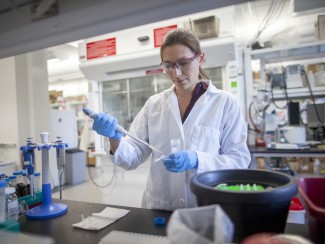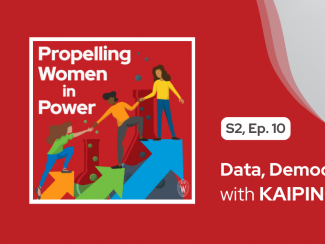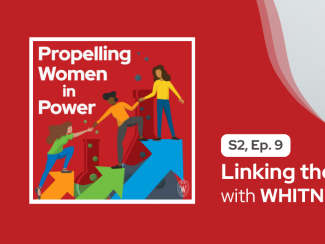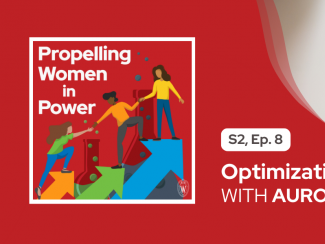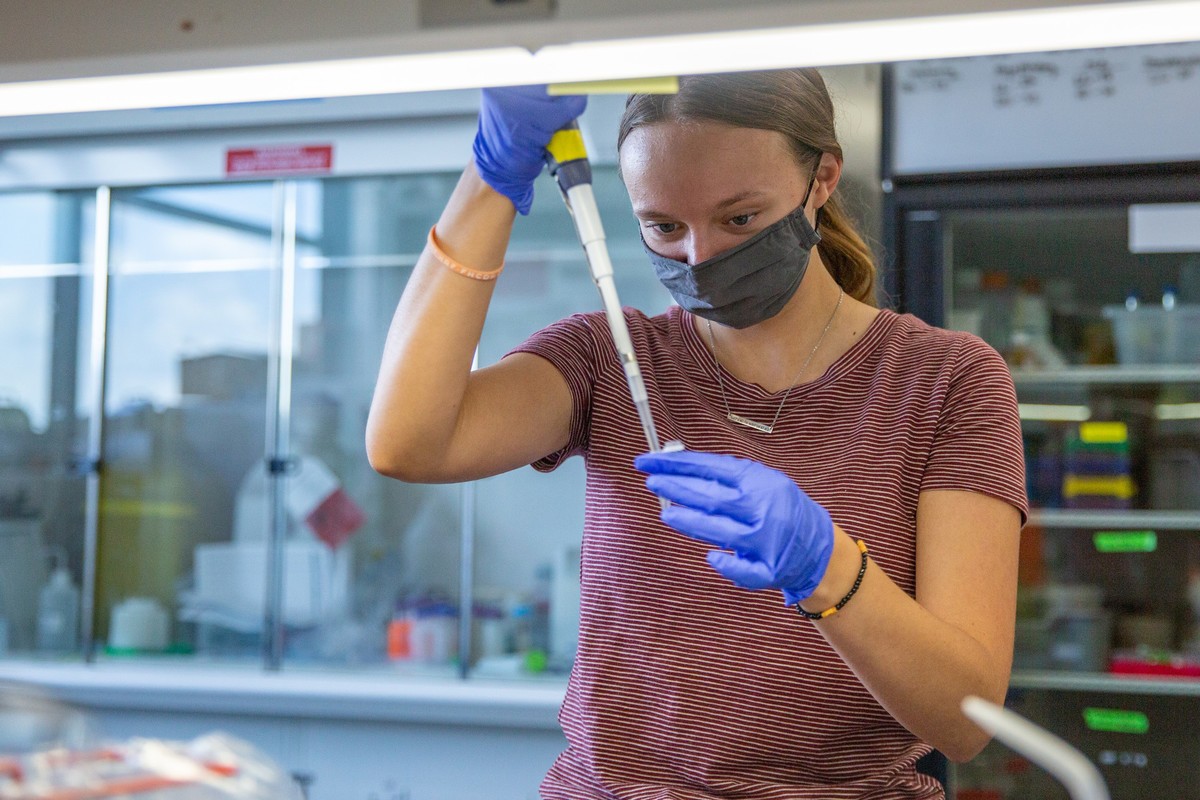
Our graduate students and postdoctoral researchers play an enormous role in the transition to a sustainable, resilient, and affordable energy future that is centered on social and economic equality. From lab experiments to field work to classrooms, these leaders of today and tomorrow are our catalysts for energy discovery.
In this series, we learn more about what inspired these talented researchers, what brought them to their field of study, and the questions that drive their work at the Wisconsin Energy Institute (WEI).
Before Megan Mader enrolled in Environmental Studies 213, a course examining the intersections of health and environment on a global scale, she did not expect the class to make her highly attuned to the impact of climate change. That, coupled with her work in a research-based course called “Tiny Earth,” Mader saw her interest in climate change and research converging, and she found herself applying to Trey Sato’s lab at the University of Wisconsin–Madison’s Wisconsin Energy Institute.
Mader, who is an undergraduate student majoring in biology and global health, talked about the Sato Lab and how it has shaped her perspective on research.
Can you tell me about your research in a way that you would describe to friends or family?
I’ve been working with Katharina Barros, a postdoctoral researcher in the lab. We have mostly been genetically modifying yeast so they can more efficiently and sustainably produce biofuels. I’ve been in the lab for about a month, and I have mostly been performing transformations which is the modification of DNA — a deletion of certain genes. I’ve also been doing a lot of PCR analyses and running tests to see whether or not those transformations worked.
What is a practical use or application of your research outside the lab?
By genetically modifying the yeast for more efficient production of biofuels, we are trying to produce biofuels that are more sustainable and better than fossil fuels. Producing more efficient and sustainable biofuels can lead to cleaner energy production and usage.
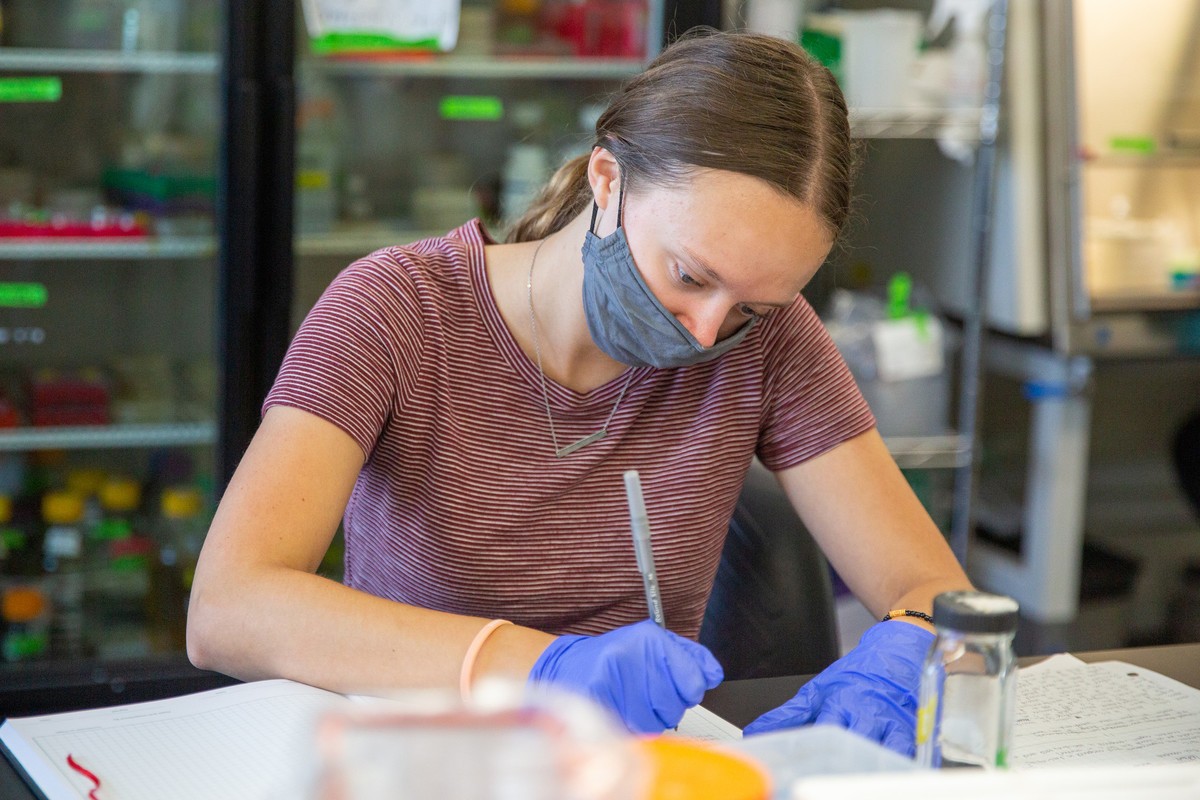
What led you to this research?
In the past year, I’ve gotten really interested in climate change. I took an environmental global health class — Environmental Studies 213 — and the class helped me realize how impactful climate change is and will be, particularly for human and planetary health. That’s part of why I like the research I do; I feel it has a real-world impact.
How did your coursework prepare you for being in a research lab?
In Spring 2022, I took a class called “Tiny Earth,” which is a research-based course looking at antibiotic resistance. I worked in a group of four students, and we designed our own experiment to look at how honey and garlic affect antibiotic resistance. We grew bacteria in honey and garlic to see whether or not they would produce more antibiotics. It was cool to learn how I can transfer my skills from class to actual research, and it gave me a good foundation knowledge of how to work in a lab and with other people.
Research involves so much collaboration, working with other people, and learning from them.
Megan Mader
How has being in the Sato lab shaped your perspective on research?
This position is my first lab position. I never realized how team-oriented research is before I joined the lab. When you think of research, you typically imagine someone sitting on a lab bench, doing their own thing. But research involves so much collaboration, working with other people, and learning from them — something I hadn’t realized before. I’m learning new things every day, whether it’s the science behind research or running the autoclave. I really like working in a team and all the people I get to work with have been super nice and knowledgeable. I look forward to going to work every day and spending time in the lab.
What do you do for fun?
Anything outdoors, like hiking. I’m from Minnesota, so I love downhill skiing. I also like reading and traveling.
What is one hobby you have?
I’m learning how to play the ukulele (that’s my goal for the summer!). I like it because it’s smaller than a guitar, and my hands aren’t big enough to play the guitar or get to all the cords, so the ukulele has been fun to learn.

